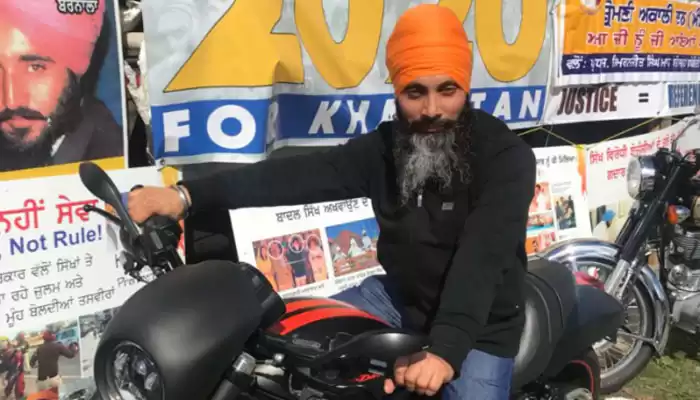'Khalistani terrorist Hardeep Singh Nijjar: Understanding his background and the India-Justin Trudeau murder controversy'
Canada expels Indian diplomat amid investigation into killing of Khalistani terrorist. Indian government denies allegations, calls them absurd.
Canada has taken a significant step in its investigation into the killing of Khalistani terrorist Hardeep Singh Nijjar by expelling a top Indian diplomat. Canadian Prime Minister Justice Trudeau has informed the Canadian Parliament that security agencies are actively pursuing potential links between agents of the Indian government and the assassination of Nijjar.
India, however, has categorically rejected these allegations, dismissing them as absurd and motivated. The Indian government's statement emphasized that similar allegations were previously made by Prime Minister Trudeau to the Indian Prime Minister, which were completely rejected.
Hardeep Singh Nijjar, the head of Guru Nanak Sikh Gurdwara Sahib, was fatally shot in Surrey by two unidentified assailants on June 18th of this year. He was a wanted terrorist according to the Indian government.
Nijjar, a 46-year-old Khalistani terrorist, was originally from the village of Bhar Singhpura in Jalandhar. He held the position of President at the Guru Nanak Sikh Gurdwara Sahib in Canada. Recently, his name was added to the list of designated terrorists by the Indian government.
In 2022, the National Investigation Agency (NIA) announced a reward of Rs 10 lakh for information leading to Nijjar's capture, following his alleged involvement in a conspiracy to kill a Hindu priest in Jalandhar, Punjab.
The Khalistan Tiger Force (KTF) was responsible for orchestrating the conspiracy to kill the Hindu priest, and Nijjar served as the chief of this Khalistani terrorist organization. Additionally, Nijjar had connections to the Khalistani terrorist organization Sikhs For Justice.
Reports suggest that Nijjar recently traveled to Australia for a 'Referendum' voting. The NIA has also charged him with conspiring to commit terrorist activities against India.
During the course of the investigation, the NIA discovered incriminating remarks, objectionable content, and shared media, including photos and videos, on Nijjar's social media accounts. These actions were aimed at creating tension within India and promoting seditionary and insurrectionary imputations.
Former Chief Minister of Punjab, Captain Amarinder Singh, had provided a list of wanted criminals to Canadian Prime Minister Justin Trudeau, which included Nijjar's name. In 2020, the Punjab Government seized Nijjar's land in his native village, totaling 11 kanal and 13.5 marlas.
Nijjar fled India and arrived in Toronto on February 10th, 1997, under the false identity of Ravi Sharma. According to Global News, Nijjar assumed a fake identity to evade Indian security forces due to his association with Sikh terrorists.
Nijjar had been linked to a Khalistani terrorist organization since the 1990s and was an associate of Gurpatwant Singh Pannun, a designated terrorist by the Indian government. Pannun leads the terrorist organization Sikhs For Justice (SFJ), which advocates for the separation of Punjab and has been involved in terrorist activities to incite unrest in the country.
Nijjar was actively involved in organizing a so-called referendum scheduled for September 18th of this year. In an interview with Global News, Pannun claimed that the NIA had placed a bounty of 1 million (CAD 16,000) on Nijjar.
Nijjar reportedly informed immigration officials that he had been tortured by the Punjab Police, who were searching for him in the 1990s. While Nijjar's father and brother were arrested, he managed to evade capture.
However, Canadian immigration officials did not believe Nijjar's claims of danger in India when he applied for asylum in June 1998. They deemed the letter he submitted as supporting evidence to be fabricated, as it contained a spelling mistake and was deemed unreliable by refugee officials.
Just eleven days after his asylum claim was rejected, Nijjar married a woman from British Columbia who sponsored him to immigrate as her spouse. However, his claims were once again dismissed by officials, who considered the marriage to be one of convenience.
Furthermore, Nijjar's wife had previously arrived in Canada in 1997, sponsored by a different husband. Despite appealing to the courts in 2001, Nijjar lost his case but later identified himself as a Canadian citizen.
It remains unclear whether Nijjar ever obtained Canadian citizenship, as he had lost several appeals in the past. However, Prime Minister Trudeau referred to him as a Canadian citizen in his recent statement.
Nijjar ran a plumbing business in Surrey and traveled to Geneva in 2013 to appeal to the UNHRC to recognize the 1984 anti-Sikh violence as a genocide. The circumstances surrounding his access to a global institution like the UNHRC are worth pondering.
In June 2014, Nijjar openly advocated for the separation of Punjab at the UN Headquarters. Five months later, in November 2014, India issued an arrest warrant for Nijjar through Interpol's National Central Bureau in New Delhi.
The warrant described him as a "mastermind/active member" of the Khalistan Tiger Force (KTF) terrorist group. It also linked Nijjar to the 2007 bombing of the Shingar Cinema in Punjab, as the suspects arrested for the blast confessed to acting under his instructions.
In 2016, a second Interpol notice accused Nijjar of being the "mastermind and key conspirator" behind multiple terrorist acts in India. He faced charges of terrorism, recruitment, and fundraising, which carried a possible life sentence. In response, Nijjar wrote a letter to Prime Minister Trudeau, dismissing the charges as baseless and fabricated.
Additionally, in March 2019, Nijjar was charged with assault, but the case was stayed in December of the same year.
Nijjar was also involved in a dispute over a commercial printing press that he had taken from Ripudaman Singh Malik, who was acquitted of involvement in the deadly 1985 Air India bombings. Malik had entrusted the press to Nijjar for safekeeping, but Nijjar refused to return it. Malik was subsequently murdered in July 2022, leading to a lawsuit in February 2023 seeking the return of the equipment.











Comments on 'Khalistani terrorist Hardeep Singh Nijjar: Understanding his background and the India-Justin Trudeau murder controversy'